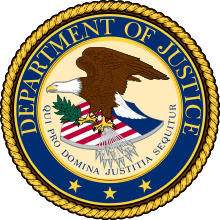Office of Professional Responsibility
The Office of Professional Responsibility (OPR) is part of the United States Department of Justice (DOJ) responsible for investigating attorneys employed by the DOJ who have been accused of misconduct or crimes in their professional functions. The OPR promulgates independent standards of ethical and criminal conduct for DOJ attorneys, while the DOJ's Office of the Inspector General (OIG) has jurisdiction of non-attorney DOJ employees. From 2009 to November 2012, the OPR was headed by Mary Patrice Brown.[1]
The OPR receives reports of allegations of misconduct made against DOJ attorneys from many sources. Nearly half of all such allegations are reported to OPR by DOJ sources, such as the attorney involved.[2] The remaining complaints come from a variety of sources, including private attorneys, defendants and civil litigants, other federal agencies, state or local government officials, judicial and congressional referrals, and media reports. OPR gives expedited attention to judicial findings of misconduct.
The OPR reviews each allegation and determines whether further investigation is warranted. The determination is a matter of investigative judgment that weighs many factors, including the nature of the allegation, its apparent credibility, its specificity, its susceptibility to verification, and the source of the allegation. A decision to open a matter does not give rise to a presumption of misconduct, nor shift the burden of proof to the accused person. The OPR's investigations involve a wide range of allegations, and the investigative methods used vary accordingly.
In many cases, the OPR notifies the accused attorney and requests a written response. Sometimes, the OPR also makes on-site investigations. The OPR reports the results of the investigation to the component head concerned and to the Office of the Deputy Attorney General. The OPR also advises the complainant and the accused attorney of its conclusion.
OPR has a policy that it doesn't report or investigate complaints for violation of duty of candor towards the tribunal that may be resolved in court. It doesn't publish this policy in the Federal Register. OPR doesn't publish agendas of its meetings or keep minutes of its meetings. [3][4][5]
References
- ↑ Holder Names New OPR Chief, The Blog of Legal Times (April 8, 2009).
- ↑ USDOJ: Office of Professional Responsibility: OPR Process
- ↑ "Office of Professional Responsibility". justice.gov/opr. United States Department of Justice. Retrieved September 7, 2016.
- ↑ http://www.law.cornell.edu/uscode/text/5/552b
- ↑ http://www.americanbar.org/groups/professional_responsibility/publications/model_rules_of_professional_conduct/rule_3_3_candor_toward_the_tribunal.html
